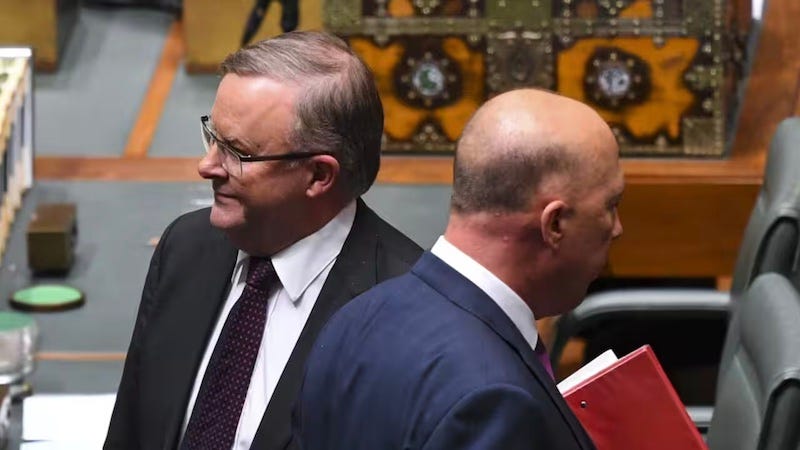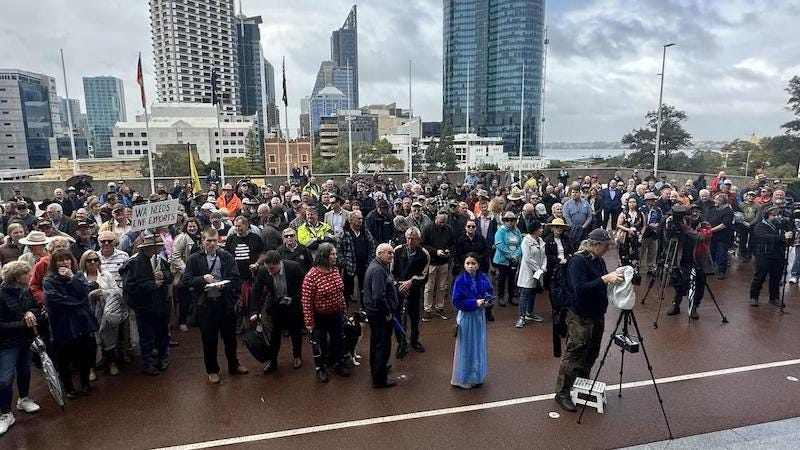Fear of change: A stalling force in Australian politics
Where are the courageous leaders who can navigate the political landscape to bring about much-needed positive social and political change?
Australia, a nation supposedly known for its free and adventurous spirit, its boldness and bravery in the face of challenges, presents a perplexing paradox when it comes to political change. While the rhetoric and caricature of the “land down under” extols the virtues of a dynamic and fearless society, its political landscape often appears as the opposite. Why is this lack of courage so prevalent in Australian politics, especially when the inertia it creates can be so easily exploited by deeply conservative forces?
The fear of change in Australia manifests in various arenas, from referendums to debates on industrial relations, and is often characterised by a pervasive belief pushed forward by conservatives that any alteration to the status quo will result in catastrophic consequences. Despite the recurrent nature of these alarmist campaigns, the doomsday scenarios have never materialised. Yet, this fear-mongering cycle continues, aided and abetted by a compliant mainstream media, perpetuating political gridlock and stifling progress.
One of the enigmatic aspects of Australian politics is the stark contrast between the cliché of nation’s adventurous spirit and its reluctance to embrace change, particularly on issues related to Indigenous rights and constitutional reform. Understanding the origins of this fear requires examining historical, cultural, and political factors that have shaped the nation’s psyche.
The roots of this fear of change could be traced back to the formation of Australia’s Constitution in 1901, or even further beyond, with the fear of the outsiders ever since invasion of the continent in 1788. The ease with which frenzies can be whipped up around constitutional amendments points to a fundamental issue in the nation’s foundational document. The Republic referendum of 1999 serves as an illustrative case, where the fear of change overshadowed any rational discourse, ultimately leading to the proposal’s defeat. Could it be that this fear is grounded in a broader anxiety about Australia itself, a continent that was stolen and now faces the potential of being reclaimed by First Nations people, even if it is on a very miniscule level?
Another significant factor contributing to this fear of change is the enduring legacy of conservatism, particularly the brand of conservatism that gained prominence under the Howard Government in 1996, which has left an indelible stain and stench on Australian politics, even when governments of a different political stripe take the reins. In the 2007 federal election campaign, Kevin Rudd, felt the need to portray himself – and the Labor Party – as ‘fiscal and social conservatives’; likewise for Anthony Albanese in 2022, who adopted a ‘cautious and careful’ leadership persona, and this behaviour of centrist or even marginally left-of-centre leaders exemplifies this enduring influence. This quasi-bipartisan conservatism has limited the scope for radical change, even when such change is urgently needed to address contemporary challenges.
The asymmetry in the way political parties present themselves exacerbates this issue. While Labor leaders often find it necessary to adopt conservative stances to appeal to a broad electorate, we are never ever going to see Liberal Party leaders announce a radical socialist agenda to counteract this conservatism. This one-sided political dynamic further reinforces the cautious and conservative approach that hampers significant change in Australia.
This fear of change is a pervasive force in Australian politics, inhibiting progress on critical issues such as Indigenous rights and constitutional reform. Rooted in historical, cultural, and political factors, this fear is compounded by a legacy of conservatism that transcends party lines. Understanding this phenomenon is crucial for the nation to move forward and embrace necessary changes in an ever-evolving world.
The combative nature of Australian politics and its implications
This fear of change is not limited to specific issues such as the Voice to Parliament or constitutional reform; it permeates the entire political landscape. Australia’s political sphere is characterised by a unique combative nature, which often impedes the progress of important policy initiatives. This combative atmosphere, coupled with conservative forces, further contributes to the inertia in Australian politics.
The adversarial nature of Australian politics makes it challenging to achieve meaningful policy reforms. Unlike some other democracies where cooperation and consensus-building are valued, Australian politics often devolves into a battleground, where conservative opposition parties act as if they are a ‘government in exile’. Even when they are out of power, the conservative Liberal Party maintains significant influence, supported by media and business sectors known for their cautious and conventional views.
Australia’s self-perception as a bold and brave nation, derived from its sporting achievements and military history, contrasts with the political climate. While Australians take pride in their national identity as fearless adventurers (albeit a trait that never seems to be inclusive of Indigenous political warriors and heroes such as Pemulwuy, Yagan or Jandamarra), political campaigns tend to appeal to anxieties and prejudices rather than their better nature. The divisive nature of campaigns, as seen in the same-sex marriage debate of 2017 and the current Voice to Parliament debate, exploits these fears and insecurities, making it easier for conservative forces to sway public opinion.
Moreover, the phenomenon of the “tall poppy syndrome” prevails in Australia, where anything that deviates from the mainstream is often met with resistance. This mentality, while intended to maintain equality and prevent arrogance, can stifle innovation and progress, even when these changes are in the best interest of the broader society.
Negative campaigning is another aspect of Australian politics that exacerbates the fear of change. Campaigns that focus on the fear of missing out or the fear of the unknown are often used to manipulate public sentiment. An example is the infamous “Don’t know; Vote no” slogan – such an inane and ignorant, albeit powerful, tactic – which tapped into fears and uncertainties during the same-sex marriage debate. This kind of messaging can easily sway public opinion and create a hostile environment for progressive change.
Australia is facing many social, economic, and political challenges that require significant reforms. However, the pervasive fear of change and the combative nature of politics have left the nation in a state of inertia, as if the populace are prisoners trapped in Plato’s cave, seeing their own shadows on the wall for the first time and being too frightened to act.
Contrary to the popular myth of Australia as a young, free-spirited nation, it has often played it safe, especially at the federal level, with a history of conservative governments dominating the political landscape. Nevertheless, there have been moments when Australia has risen to the occasion and embraced change in the past, so why is it not doing it now?
Breaking the stalemate: A call for courageous leadership and common sense
A more recent example of this lack of courage relates to the Australian Greens’ proposal to legalise cannabis. Despite substantial public support – around 78 per cent, according to opinion polls – and potential economic benefits, the immediate rejection of the proposal by the Labor government reflects the prevailing resistance to positive social reforms.
While this is only one minor part of social reform, where are the courageous leaders who can navigate the political landscape with empathy, compassion, and common sense to bring about the much-needed positive social and political change?
The reluctance to embrace positive social reforms, such as the legalisation of cannabis – or the reluctance to establishment of an anti-poverty commission (for goodness sake!), highlights the prevailing fear of change in Australian politics. The question arises: What is the root cause of this fear? Is it the apprehension of negative media headlines, religious and conservative backlash, or perhaps the influence of powerful interest groups like the Christian lobby?
These examples underscore the challenges in breaking through the political inertia. Even in states where one party holds a significant majority, like Western Australia where the Labor government holds 53 of 59 seats in the lower house, and has control of the legislative council, misrepresentation and resistance from opposing parties can hinder meaningful change.
The Liberal Party in Western Australia only holds two seats, and is not even the official opposition, but it managed to create an outrage about recent changes to Aboriginal cultural heritage laws. The result: the laws were repealed soon after they were introduced. It becomes evident that courage, leadership, and a genuine commitment to progress are essential components in overcoming these barriers.
Australia needs leaders who are unafraid to take calculated risks, challenge the status quo, and engage in constructive dialogue on critical issues. That’s their job: otherwise, why make the huge effort of getting in parliament, and then getting into government, and then wilt at the first sight of resistance? This is how the conservatives win, and it’s almost as though they don’t need to sit on the government benches to be in power and control the political agenda.
This is a significant obstacle in Australian politics, leading to political stagnation and missed opportunities for positive social and political reform. To break free from this stalemate, Australia needs leaders who are unafraid to challenge the status quo, engage in evidence-based policymaking, and prioritise the wellbeing of their citizens.
It is time for courageous leadership, empathy, and common sense to guide the nation toward a future characterised by progress, compassion, and inclusivity. Only then can Australia overcome its fear of change and address the pressing challenges of the twenty-first century.









